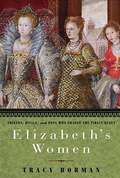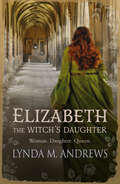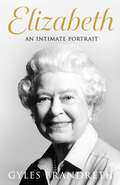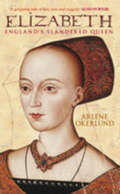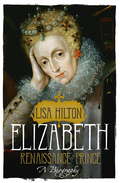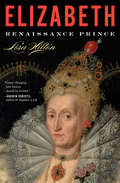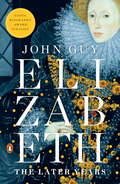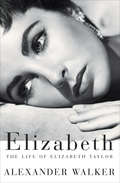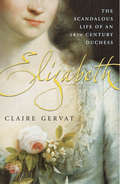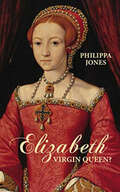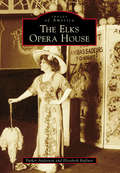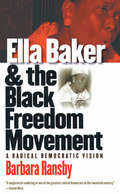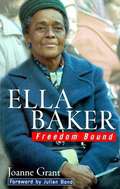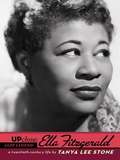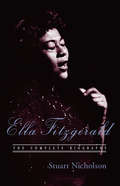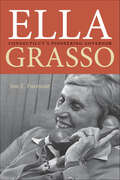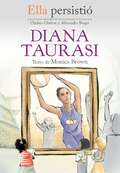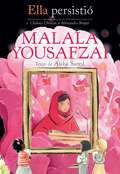- Table View
- List View
Elizabeth's Women: Friends, Rivals, and Foes Who Shaped the Virgin Queen
by Tracy BormanA source of endless fascination and speculation, the subject of countless biographies, novels, and films, Elizabeth I is now considered from a thrilling new angle by the brilliant young historian Tracy Borman. So often viewed in her relationships with men, the Virgin Queen is portrayed here as the product of women—the mother she lost so tragically, the female subjects who worshipped her, and the peers and intimates who loved, raised, challenged, and sometimes opposed her.In vivid detail, Borman presents Elizabeth’s bewitching mother, Anne Boleyn, eager to nurture her new child, only to see her taken away and her own life destroyed by damning allegations—which taught Elizabeth never to mix politics and love. Kat Astley, the governess who attended and taught Elizabeth for almost thirty years, invited disaster by encouraging her charge into a dangerous liaison after Henry VIII’s death. Mary Tudor—“Bloody Mary”—envied her younger sister’s popularity and threatened to destroy her altogether. And animosity drove Elizabeth and her cousin Mary Queen of Scots into an intense thirty-year rivalry that could end only in death.Elizabeth’s Women contains more than an indelible cast of characters. It is an unprecedented account of how the public posture of femininity figured into the English court, the meaning of costume and display, the power of fecundity and flirtation, and how Elizabeth herself—long viewed as the embodiment of feminism—shared popular views of female inferiority and scorned and schemed against her underlings’ marriages and pregnancies.Brilliantly researched and elegantly written, Elizabeth’s Women is a unique take on history’s most captivating queen and the dazzling court that surrounded her. From the Hardcover edition.
Elizabeth, The Witch's Daughter
by Lynda M. AndrewsFrom princess, to outcast, to powerful monarch, the tumultuous beginnings of the Virgin Queen are brought to life by the #1 bestselling author. It is recorded that never once during her life did Elizabeth Tudor speak of her mother Anne Boleyn; but did she never think of her? As a little girl, Elizabeth Tudor knows she is a princess but one day is suddenly told she is now &“the Lady Elizabeth.&” She witnesses from the sidelines the glittering splendor of her father&’s court, and the terrifying consequences of his wrath. With few she can trust, Elizabeth comes to womanhood during the reigns of her brother and sister, shrouded by a web of deceit. She lives in constant danger, yet rises above her detractors to defy her mother&’s legacy, and go down in history as one of England&’s most ruthless and powerful monarchs. Her life became a testament to the ambitions demonstrated of her parents. Just how much of an influence did Henry VIII&’s most notorious wife have on her child? And was Elizabeth&’s accession Anne Boleyn&’s final triumph over death? A powerful and compelling tale, this is the perfect read for fans of Anne O&’Brien, Elizabeth Chadwick, and Alison Weir. It is the first of four newly reissued classics of historical fiction, which also include The Tudor Heritage, The White Lion of Norfolk and The Danish Queen.
Elizabeth: A Biography of Britain's Queen
by Sarah BradfordA comprehensive biography of Elizabeth II.
Elizabeth: An intimate portrait from the writer who knew her and her family for over fifty years
by Gyles BrandrethTHE NO 1 SUNDAY TIMES BESTSELLER NOW FEATURING EXCLUSIVE MATERIAL ABOUT CHARLES III's CORONATION WITH ADDED PHOTOGRAPHSA personal account of the life and character of Britain's longest-reigning monarch, from the writer who knew her family best'Compelling . . . Fascinating' DAILY MAIL'The writer who got closest to the human truth about our long-serving senior royals' THE TIMES'The book overflows with nuggets of insider knowledge' TELEGRAPHPaints a unique picture of the remarkable woman who reigned for seven decades. Fascinating insights' HELLO!__________Gyles Brandreth first met the Queen in 1968, when he was twenty.Over the next fifty years he met her many times, both at public and at private events. Through his friendship with the Duke of Edinburgh, he was given privileged access to Elizabeth II.He kept a record of all those encounters, and his conversations with the Queen over the years, his meetings with her family and friends, and his observations of her at close quarters are what make this very personal account of her extraordinary life uniquely fascinating.From her childhood in the 1920s to the era of Harry and Meghan in the 2020s, from her war years at Windsor Castle to her death at Balmoral, this is both a record of a tumultuous century of royal history and a truly intimate portrait of a remarkable woman.Enjoy this special edition now featuring an exclusive postscript about King Charles III's Coronation with photographs.__________Praise for Gyles Brandreth's bestselling royal writing:'Beautifully written book. I have read many other books about Philip but this is the best' DAILY EXPRESS'Brilliant, totally inspiring . . . It's a joy to read a book that comes from a perspective of fondness' KIRSTIE ALLSOPP, THE TIMES'As a sparkling celebration of Prince Philip, the book will be hard to beat' TELEGRAPH'So readable and refreshing even after the millions of words that have been written about Prince Philip in the past couple of weeks' THE TIMES'Brilliant . . . There is so much in this book you won't find anywhere else' LORRAINE
Elizabeth: England's Slandered Queen
by Arlene OkerlundElizabeth Wydeville, Queen consort to Edward IV, has traditionally been portrayed as a scheming opportunist. But was she a cunning vixen or a tragic wife and mother? As this extraordinary biography shows, the first queen to bear the name Elizabeth lived a tragedy, love, and loss that no other queen has since endured. This shocking revelation about the survival of one woman through vilification and adversity shows Elizabeth as a beautiful and adored wife, distraught mother of the two lost Princes in the Tower, and an innocent queen slandered by politicians.
Elizabeth: Renaissance Prince
by Lisa HiltonA definitive portrait of one of the most compelling monarchs England has ever had: Elizabeth I.'We are a prince from a line of princes.'Lisa Hilton's majestic biography of Elizabeth I, 'The Virgin Queen', uses new research to present a fresh interpretation of Elizabeth as a queen who saw herself primarily as a Renaissance prince, delivering a very different perspective on her emotional and sexual life, and upon her attempts to mould England into a European state. Elizabeth was not an exceptional woman but an exceptional ruler, and this book challenges readers to reassess her reign, and the colourful drama, scandal and intrigue to which it is always linked.
Elizabeth: Renaissance Prince
by Lisa HiltonA definitive portrait of one of the most compelling monarchs England has ever had: Elizabeth I.'We are a prince from a line of princes.'Lisa Hilton's majestic biography of Elizabeth I, 'The Virgin Queen', uses new research to present a fresh interpretation of Elizabeth as a queen who saw herself primarily as a Renaissance prince, delivering a very different perspective on her emotional and sexual life, and upon her attempts to mould England into a European state. Elizabeth was not an exceptional woman but an exceptional ruler, and this book challenges readers to reassess her reign, and the colourful drama, scandal and intrigue to which it is always linked.
Elizabeth: Renaissance Prince
by Lisa HiltonThis surprising portrait of the Tudor queen offers an &“ambitious re-examination of the intersection of gender and monarchy&” (The New York Times Book Review). Queen Elizabeth I was all too happy to play on courtly conventions of gender when it suited her &“&‘weak and feeble&’ woman&’s body&” to do so for political gain. But in Elizabeth, historian Lisa Hilton offers ample evidence why those famous words should not be taken at face value. With new research out of France, Italy, Russia, and Turkey, Hilton&’s fresh interpretation is of a queen who saw herself primarily as a Renaissance prince—an expert in Machiavellian statecraft. Elizabeth depicts a sovereign less constrained by her femininity than most accounts claim, challenging readers to reassess Elizabeth&’s reign and the colorful drama and intrigue to which it is always linked. It&’s a fascinating journey that shows how a marginalized newly crowned monarch, whose European contemporaries considered her to be the illegitimate ruler of a pariah nation, ultimately adapted to become England&’s first recognizably modern head of state.
Elizabeth: The Forgotten Years
by John GuyA groundbreaking reconsideration of our favorite Tudor queen, Elizabeth is an intimate and surprising biography that shows her at the height of her power by the bestselling, Whitbread Award-winning author of Queen of Scots. Elizabeth was crowned at twenty-five after a tempestuous childhood as a bastard and an outcast, but it was only when she reached fifty and all hopes of a royal marriage were dashed that she began to wield real power in her own right. For twenty-five years she had struggled to assert her authority over advisers who pressed her to marry and settle the succession; now, she was determined not only to reign but also to rule. In this magisterial biography of England's most ambitious Tudor queen, John Guy introduces us to a woman who is refreshingly unfamiliar: at once powerful and vulnerable, willful and afraid. In these essential and misunderstood forgotten years, Elizabeth confronts challenges at home and abroad: war against the Catholic powers of France and Spain, revolt in Ireland, an economic crisis that triggered riots in the streets of London, and a conspiracy to place her cousin Mary Queen of Scots on her throne. For a while she was smitten by a much younger man, but could she allow herself to act on that passion and still keep her throne? For the better part of a decade John Guy mined long-overlooked archives, scouring court documents and handwritten letters to sweep away myths and rumors. This prodigious historical detective work has made it possible to reveal for the first time the woman behind the polished veneer: wracked by insecurity, often too anxious to sleep alone, voicing her own distinctive and surprisingly resonant concerns. Guy writes like a dream, and this combination of groundbreaking research and propulsive narrative puts him in a class of his own.From the Hardcover edition.
Elizabeth: The Life of Elizabeth Taylor (Isis Large Print Ser.)
by Alexander WalkerA serious and in-depth look at one of the great legends of Hollywood by the London film critic and author of Audrey: Her Real Story. Elizabeth Taylor was perhaps the most “public” of the great stars: an Oscar-winning actress who lived her entire life in the glare of the spotlights. Much has been written about her, but now—with the readability, sensitivity, and thoroughness that have made his previous biographies bestsellers—Alexander Walker explores the roots of Taylor’s extraordinary personality and extraordinary life. Here is a life to rival the very movies she played in, told with immense candor, wit, and sympathy: from her privileged London childhood, the enormous influence of her strong-willed mother, and her swift rise to stardom in such films as National Velvet, A Place in the Sun, and the catastrophe-ridden Cleopatra; to her six husbands, her desperate need to love and be loved, her obsession with jewelry, and the amazing resilience that helped her weather not only condemnation for “the most public adultery in history,” but also dramatic illnesses that brought her to the verge of death—and, according to her, beyond. Using scores of unpublished documents and interviews with those who knew Taylor best, as well as his own meetings with her over thirty years, Alexander Walker recreates the comedies and tragedies in the life of a woman whose rewards and scandals have become the stuff of legend.
Elizabeth: The Scandalous Life of an 18th Century Duchess
by Claire GervatElizabeth Chudleigh was one of the eighteenth century's most colourful characters. Born into impoverished gentility, her beauty, wit and vitality soon earned her a place at the centre of court life. When she married the Duke of Kingston in 1769 she had reached the highest rung of the social ladder. But Elizabeth was carrying a dark secret. In 1744 she had secretly married a naval lieutenant called Augustus Hervey, and after the Duke's death her first marriage was discovered. Bigamy fever swept London society and, in a very public trial, Elizabeth was found guilty. But her strength of character ensured that, even when her friends deserted her, her courage and zest for life did not. In an engaging history of this strong and wilful woman, Gervat shows there was far more to Elizabeth than the caricature villain her contemporaries made her out to be.
Elizabeth: The Struggle for the Throne
by David StarkeyTraces the early years of Elizabeth I before she became Queen in 1558. Covers the end of the reign of Henry VIII as well as the reigns of his son Edward VI and his daughter Mary.
Elizabeth: Virgin Queen?
by Phillipa JonesThe author of The Other Tudors delves into the Virgin Queen myth, Elizabeth&’s secret &“love life,&” and the children she may have had as a result. &“Virgin Queen&” is the name for which the powerful and fearless daughter of Henry the Eighth and Anne Boleyn is best remembered, and may explain why Elizabeth was the last of the Tudor monarchs. But how appropriate is that reputation? Were Elizabeth&’s suitors and favorites really just innocent intrigues? Or were they much more than that? Was Elizabeth really a woman driven by her passions, who had affairs with several men, including Thomas Seymour, while he was still the husband of her guardian Catherine Parr, and Robert Dudley, Earl of Leicester—a man adjudged to have been the great love of her life? Are the rumors of Elizabeth&’s illegitimate children true? Was the &“Virgin Queen&” image a carefully thought out piece of Tudor propaganda? Historian Philippa Jones, author of the acclaimed The Other Tudors, challenges the many myths and truths surrounding Elizabeth&’s life and reveals the passionate woman behind the scenes.
Elk Love: A Montana Memoir
by Lynne Spriggs O'ConnorHaving spent ten summers on the Blackfeet Indian Reservation near Glacier National Park, part of her doctoral fieldwork for a PhD in Native American Art History, forty-two-year-old Lynne Spriggs thinks of Montana as her healing place. When she moves to “Big Sky Country” from the East Coast in a quest to reset her life, she has high hopes for what awaits her. Great Falls, a farming and military town in central Montana, is not what Lynne imagined when she decided to leave city life behind. But her dream of being more connected to nature in the American West comes alive when she meets Harrison, a handsome rancher thirteen years her senior. Wary but curious, with her dog Willow by her side, she leans into the seasonal rhythms of Harrison’s hidden valley and opens her heart to a wild language that moves beyond words. In a modern world where listening is rare, Elk Love explores an intimate place where loneliness gives way to wonder, where the natural world speaks of what matters most.
Elks Opera House, The (Images of America)
by Parker Anderson Elisabeth RuffnerFor over 100 years, the Elks Opera House has been a landmark of the cultural scene in Prescott, Arizona, and the western United States. In 1904, the people of Prescott raised $15,000 toward a performance hall to be included in the Elks Building. The original structure featured opera boxes that were later removed to adapt to the demands of motion pictures, and the entire proscenium arch was covered with wood paneling. In 2010, the Elks Opera House Foundation completed major renovations to restore the original 1905 grandeur of the theater and the 1928 marquee, which was paid for by grants from local charitable foundations, Arizona historic preservation funds, and generous participation by businesses and individuals. The Elks Building was listed in the National Register of Historic Places in 1978.
Ella Baker and the Black Freedom Movement
by Barbara RansbyOne of the most important African American leaders of the twentieth century and perhaps the most influential woman in the civil rights movement, Ella Baker (1903-1986) was an activist whose remarkable career spanned fifty years and touched thousands of lives. A gifted grassroots organizer, Baker shunned the spotlight in favor of vital behind-the-scenes work that helped power the black freedom struggle. She was a national officer and key figure in the National Association for the Advancement of Colored People, one of the founders of the Southern Christian Leadership Conference, and a prime mover in the creation of the Student Nonviolent Coordinating Committee. Baker made a place for herself in predominantly male political circles that included W. E. B. Du Bois, Thurgood Marshall, and Martin Luther King Jr., all the while maintaining relationships with a vibrant group of women, students, and activists both black and white.In this deeply researched biography, Barbara Ransby chronicles Baker's long and rich political career as an organizer, an intellectual, and a teacher, from her early experiences in depression-era Harlem to the civil rights movement of the 1950s and 1960s. Ransby shows Baker to be a complex figure whose radical, democratic worldview, commitment to empowering the black poor, and emphasis on group-centered, grassroots leadership set her apart from most of her political contemporaries. Beyond documenting an extraordinary life, the book paints a vivid picture of the African American fight for justice and its intersections with other progressive struggles worldwide across the twentieth century.One of the most important African American leaders of the twentieth century and perhaps the most influential woman in the civil rights movement, Ella Baker (1903-1986) was an activist whose remarkable career spanned fifty years and touched thousands of lives. In this deeply researched biography, Barbara Ransby chronicles Baker's long and rich political career as an organizer, an intellectual, and a teacher, from her early experiences in depression-era Harlem to the civil rights movement of the 1950s and 1960s. Ransby paints a vivid picture of the African American fight for justice and its intersections with other progressive struggles worldwide across the twentieth century.-->
Ella Baker: Freedom Bound
by Joanne GrantThis is the story of Miss Ella Baker who once worked for Martin Luther King, Jr. She is both one of thousands of anonymous women and men who made the twentieth-century movement for expanded democracy work, and among the most extraordinary members of that group. It is time for a larger audience to meet her, and thanks to Joanne Grant, they will.
Ella Fitzgerald
by Tanya Lee StoneThe name ?Ella Fitzgerald? brings to mind a silky voice crooning jazz standards. The First Lady of Song earned her nickname by touring almost nonstop for over fifty years, winning thirteen Grammys, and recording album after album. But who was the woman behind the name? How did a teenage runaway become a renowned jazz singer? Long after her homeless days, Ella remained insecure?she often suffered stage fright. Yet she was a born performer, able to improvise lyrics and record songs in single takes. She even seemed more comfortable on stage than off, and close friends found her hard to truly know. Tanya Lee Stone?s Up Close biography delivers several never-before-published details of this intensely private, legendary singer?s life.
Ella Fitzgerald: A Biography of the First Lady of Jazz, Updated Edition
by Stuart NicholsonStuart Nicholson's biography of Ella Fitzgerald is considered a classic in jazz literature. Drawing on original documents, interviews, and new information, Nicholson draws a complete picture of Fitzgerald's professional and personal life. Fitzgerald rose from being a pop singer with chart-novelty hits in the late '30s to become a bandleader and then one of the greatest interpreters of American popular song. Along with Billie Holiday, she virtually defined the female voice in jazz, and countless others followed in her wake and acknowledged her enormous influence. Also includes two 8-page inserts.
Ella Grasso: Connecticut's Pioneering Governor (The Driftless Connecticut Series)
by Jon E. PurmontWhen Ella Tambussi Grasso ran for governor of Connecticut in 1974, she had not lost an election since she was first voted into the state's General Assembly in 1952. The people of Connecticut chose her as the nation's first woman to be elected governor in her own right—the capstone of a long and successful career dedicated to public service, effective government, and the democratic process. During her tenure as governor, Grasso's leadership was tested in the face of fiscal problems, state layoffs, and budget shortfalls. The daughter of Italian immigrants, she endeared herself to her constituents during the great Blizzard of 1978, when she stayed at the State Armory around the clock to direct emergency operations and make frequent television appearances. Author Jon E. Purmont, who served as Grasso's executive assistant when she was governor, draws on his diary from that time, research in Grasso's archives, and interviews with Grasso's family and friends to give us a rich and intimate portrait of this political pioneer.
Ella in Europe: An American Dog's International Adventures
by Michael KonikPart travelogue, part valentine to a beloved pet, "Ella in Europe" chronicles Konik's magical six-week journey through Europe with his dog, Ella.
Ella persistió - Diana Taurasi / She Persisted: Diana Taurasi (Ella persistió #Volumen)
by Chelsea ClintonInspirado en el bestseller #1 del New York Times Ella persistió / She Persisted de Chelsea Clinton y Alexandra Boiger, llega ahora esta serie en Chapter Books sobre mujeres que sobresalieron, lucharon y se levantaron contra viento y marea, como Diana Taurasi. Cuando Diana Taurasi era pequeña, el baloncesto femenino profesional no existía en los Estados Unidos. Pero se esforzó mucho para crear oportunidades para sí misma, ganó campeonatos de baloncesto en la universidad, eventualmente jugó para la WNBA con los Phoenix Mercury y también ganó múltiples medallas de oro olímpicas. En este libro biográfico escrito por la galardonada autora Mónica Brown, los lectores aprenderán sobre la increíble vida de Diana Taurasi y cómo ella persistió. ¡El libro incluye una introducción de Chelsea Clinton, ilustraciones en blanco y negro y una lista de maneras en que los lectores pueden seguir los pasos de Diana Taurasi y así marcar la diferencia! ¡Y no te pierdas los demás libros de la serie She Persisted, con muchas más mujeres que persistieron, como Coretta Scott King, Harriet Tubman, Sonia Sotomayor, Malala Yousafzai y otras más!
Ella persistió - Malala Yousafzai / She Persisted: Malala Yousafzai (Ella persistió #Volumen)
by Aisha Saeed Chelsea ClintonInspirado en el bestseller #1 del New York Times Ella persistió / She Persisted de Chelsea Clinton y Alexandra Boiger, llega ahora esta serie en Chapter Books sobre mujeres que sobresalieron, lucharon y se levantaron contra viento y marea, como Malala Yousafzai. Durante su niñez en Pakistán, Malala Yousafzai tuvo que luchar contra muchos obstáculos para poder acceder a una educación. Después de ser atacada por el hecho de pelear por ese derecho, Malala llevó su lucha al escenario mundial, exigiendo el derecho a la educación para todas las niñas, en todas partes del mundo. Su activismo le valió un Premio Nobel de la Paz e inspiró a niñas y mujeres de todo el mundo a defender sus propios derechos también. En este libro biográfico escrito por la autora ganadora de varios premios Aisha Saeed, los lectores aprenderán sobre la increíble vida de Malala Yousafzai y cómo ella persistió. ¡El libro incluye una introducción de Chelsea Clinton, ilustraciones en blanco y negro y una lista de maneras en que los lectores pueden seguir los pasos de Malala Yousafzai y así marcar la diferencia! ¡Y no te pierdas los demás libros de la serie She Persisted, con muchas más mujeres que persistieron, como Coretta Scott King, Harriet Tubman, Sonia Sotomayor, Diana Taurasi y más!
Ella persistió alrededor del mundo: 13 mujeres que cambiaron la historia
by Chelsea ClintonEn todo el mundo, las mujeres siempre han soñado en grande, aun cuando les han dicho que sus sueños no cuentan. Han alzado sus voces, se han levantado en protesta y han luchado por lo que es justo, a pesar de que, a veces, sus voces han sido silenciadas. Ya sea en las ciencias, las artes, los deportes o como activistas, mujeres y niñas a lo largo de la historia han luchado por romper barreras y cambiar el statu quo. No han permitido que otros se interpongan en su camino, nos han ayudado a entender mejor nuestro mundo y lo que es posible lograr. En este segundo libro, compañero de Ella persistió: 13 mujeres americanas que cambiaron el mundo, Chelsea Clinton presenta al lector a un grupo de trece increíbles mujeres de todo el mundo que han conformado la historia.Ella persistió alrededor del mundo es un libro para todos aquellos que han querido alcanzar las estrellas y les han dicho que no es posible, para todos los que han alzado sus voces y han sido silenciados y para todos los que, en alguna ocasión, se han sentido pequeños, insignificantes, sin importancia. Las vívidas ilustraciones de Alexandra Boiger que acompañan este inspirador texto muestran a los lectores de todas las edades que no importan los obstáculos que encuentren en su camino, pues tienen el poder de perseverar y triunfar.
Ella persistió en el deporte: Americanas olímpicas que revolucionaron el juego
by Chelsea ClintonA lo largo de la historia, en cada deporte, y en todos los niveles de juego, a las mujeres con aspiraciones en el deporte les han dicho que nunca serían lo suficientemente veloces, fuertes o buenas. En este libro, Chelsea Clinton nos presenta a varias de estas mujeres que han sobresalido en el deporte por su pasión, habilidad y perseverancia. Ella persistió en el deporte es un libro para todos aquellos que se han propuesto alcanzar una meta y les han dicho que no es posible, para todos aquellos que la meta final de una carrera parecía muy lejana y para los que, en alguna ocasión, se han sentido pequeños o insignificantes en el campo de juego.Las expresivas ilustraciones de Alexandra Boiger que acompañan este inspirador texto muestran a los lectores de todas las edades que no importan los obstáculos que encuentren en su camino, pues tienen el poder de perseverar y triunfar. Las mujeres pueden ganar y revolucionar el juego.
